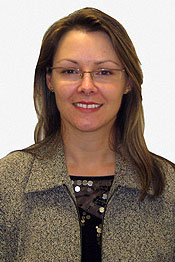
Professor Nadine Foster, Director of STARS Education and Research Alliance
What is your role at STARS?
As the Director of the Surgical, Treatment and Rehabilitation Service (STARS) Education and Research Alliance (SERA), I am a conjoint (or joint appointment) between Metro North Health and The University of Queensland. The STARS Education and Research Alliance’s goals are to lead innovation in care, training and research in specialist surgical and rehabilitation services. We want to embed clinical education and research in ways that achieve improved outcomes for patients, and provide students with high quality clinical training here in STARS.
What is your background?
I qualified as a physiotherapist in Northern Ireland in 1993 and pursued clinical research and academic developments early in my career, with a PhD in 1998, roles in education and research in England, followed by several personal research fellowships from the National Institute for Health Research (NIHR) that meant more time for clinical research. Most recently I was leading a research group in Keele University in the UK focused on musculoskeletal conditions, particularly back pain and osteoarthritis, and leading randomised trials testing treatments and models of care, all embedded within the National Health Service (NHS). My work has had particularly good impact on clinical practice, given it has been embedded in practice, asking and answering important clinical questions about how to improve clinical care and patients’ outcomes. I was also Director of a registered Clinical Trials Unit (CTU) in the UK (Keele CTU), the NIHR’s Lead Training Advocate for Physiotherapy (championing clinical academic careers particularly of the non-medical health care professionals in the UK) and Chair of the NIHR’s Clinical Doctoral Research Fellowship funding panel.
You crossed the big ditch to come to STARS. What attracted you to STARS?
The genuine commitment to bring together the worlds of clinical care, clinical education and clinical research in the new hospital that is STARS is the attractive vision that caught my attention. Partnerships between healthcare services and universities can bring real benefits, for patients, for healthcare professionals and for developing, delivering and implementing the kind of clinically-led research that makes a real difference. The fact that STARS is a new hospital embedding clinical research activities and a conjoint team from the beginning was important for me, alongside the opportunity to scale-up research and innovation from STARS to other sites in Metro North. I am really keen to help Metro North and The University of Queensland engage in high quality research particularly with international collaborations.
What is to come for the STARS Education and Research Alliance?
Across the three overlapping areas of clinical practice, clinical education and clinical research, this Alliance will add value and seek to support and develop new initiatives that take advantage of our conjoint team working with the clinical teams in STARS. Our team includes Professor Teresa Green (nursing), Dr Annie Hill (speech pathology), Dr Ingrid Rosbergen (physiotherapy), Dr Emmah Doig (occupational therapy), Karina O’Leary (Interprofessional Education Co-ordinator) and Jasmine Kellaway (research manager). In the area of clinical practice, this will include Best Practice Groups and Seminars, and exploration of new models of care. In the area of clinical education this will include a focus on interprofessional education (IPE) activities, that support The University of Queensland’s IPE curriculum, providing positive clinical placement experience for students. In the area of research, this will include the development of the STARS research strategy, in which STARS-led research is key, as well as collaboration on research led by others, including national and international collaborations. Our conjoint team and university partners will support early career researchers and clinicians in developing their skills and expertise to ensure next-generation clinical research leaders.
The STARS Research and Education partnership is for 20 years. Where do you see the future of health in 20 years from now?
All healthcare systems are struggling with a similar challenge – how to meet the increasing healthcare needs and expectations of our aging population in ways that are effective and affordable. To achieve this we need healthcare to be a learning system, embedding research and innovation in routine practice in ways that ensure that today’s research is tomorrow’s treatment. We have to identify low value care and redirect healthcare resources to providing high value care that benefits patients. Whilst the future of health includes an ageing population with greater multimorbidity, it also includes greater opportunities for education and prevention, better self-management and greater interdisciplinary collaboration. The use of clinical data for research and innovation purposes will become routine, and increasing access to information will mean that patients are better informed than ever about their health and the care they should receive.
When not at STARS you will find Nadine…
Just now, you will find me walking with my husband and two dogs around Brisbane getting to know this wonderful new place. We lived rurally in England so it’s a big change for us to be in a city. Over time I hope you will find me exploring wider Queensland and Australia, in our new 4×4 (just purchased) with fridge and awning (still to come), if not on horseback.